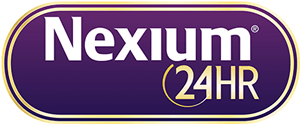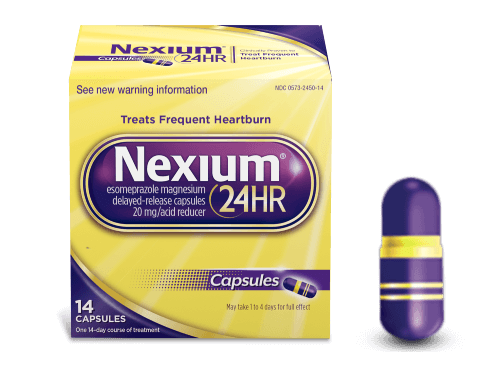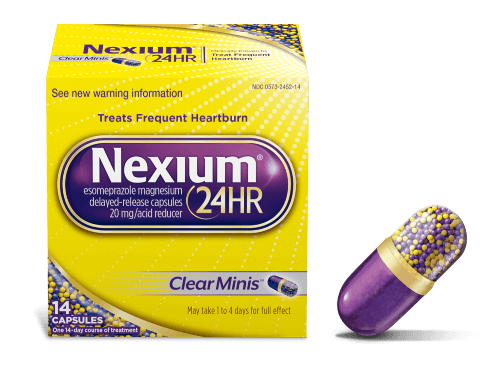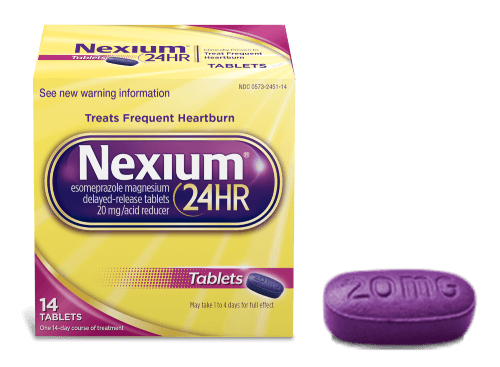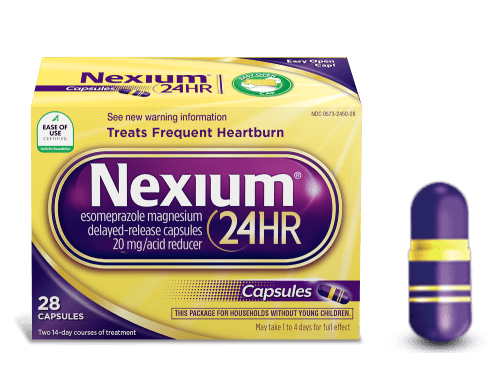The class of medicines known as proton pump inhibitors (PPI) are commonly used to treat heartburn, stomach ulcers and acid reflux.1 Nexium 24HR, whose active ingredient is known as esomeprazole, falls into this category of PPI.1 Nexium 24HR is an OTC medicine used for treating frequent heartburn.
There can be side effects to PPI medications, though.1 If you’re suffering from heartburn or other stomach-related issues, it can be helpful to identify these issues and take care of them before they disrupt your quality of life.
What are proton pump inhibitors?
We all require stomach acid to help break down the food we eat so that we can fully digest it.2 Stomach acid also helps kill harmful germs in your gut, which is necessary to maintain gut and digestive health.2
However, too much stomach acid can cause problems: the acid reflux is when stomach acid leaks into one’s esophagus, irritating and potentially damaging its lining.2
This is where PPIs come in: in addition to treating frequent heartburn as an OTC medicine, as a prescription medicine, it can also treat the following:2
- Stomach (peptic) ulcers: if excess stomach acid flows the opposite direction from your esophagus, it can damage the inner lining within your stomach and small intestine, which can lead to ulcers.
- H. pylori infection: these bacteria can throw off the acid (or pH) levels of your stomach, and high acidic levels can lead to heartburn and acid reflux.
- Stomach acid levels: by balancing stomach acid levels, PPIs give your esophagus time to heal from acidic damage.
It’s important to note that only prescription PPIs are indicated for treating peptic ulcers and managing H. pylori infections. An OTC PPI, like Nexium 24HR is indicated only for frequent heartburn (heartburn occurring 2 or more days a week) used as 14-day regimen.
Common side effects of proton pump inhibitors
Some of the most common side effects that users of PPI medications report include the following:2
- Abdominal pain
- Constipation or diarrhea
- Dizziness
- Dry mouth
- Headaches or light-headedness
- Vomiting
- Fever
Overall, side effects from PPIs are rare.3 Headaches have been reported as an increased risk while on PPIs.5 Additionally, PPI medication may interfere with other medications that you might be on, such as anti-seizure medicines and blood thinners.3
How to mitigate the side effects of PPI medications
Some of the most common side effects associated with taking PPIs include: nausea, intestinal issues (gas, diarrhea, constipation, stomachache), headaches, and dizziness.1
Schedule an esophageal pH test with your doctor, which measures the acid levels in your stomach.4 This test can determine whether your acid reflux has been treated, or if you still need to continue using medication.
You should also contact your provider if you notice concerning side effects, including:2
- allergic reactions such as rash, hives, or swelling
- kidney-related issues such as reduced urination
- low magnesium, which can lead to fatigue or an irregular heartbeat
- red, blistering or peeling skin
- severe diarrhea or fever
As with starting any new medication or healthcare routine, it’s important to consult your healthcare professional to determine any symptoms that you’re feeling, and recommended dosages to manage your heartburn or acid reflux. It’s worth remembering that PPIs like Nexium 24HR have been around for years and are considered safe and effective in treating these conditions, and rarely have disruptive symptoms.2
Source Citations:
- Esomeprazole. Medline Plus. https://medlineplus.gov/druginfo/meds/a699054.html/. Accessed May 17, 2024.
- Proton Pump Inhibitors. Cleveland Clinic. https://my.clevelandclinic.org/health/articles/proton-pump-inhibitors/. Accessed May 17, 2024.
- Proton pump inhibitors. Medline Plus. https://medlineplus.gov/ency/patientinstructions/000381.htm/. Accessed May 17, 2024.
- Esophageal pH Test. Medline Plus. https://medlineplus.gov/lab-tests/esophageal-ph-test/. Accessed May 17, 2024.
- Proton pump inhibitor-related headaches: a nationwide population-based case-crossover study in Taiwan. National Library of Medicine. https://pubmed.ncbi.nlm.nih.gov/24853165/. Accessed May 17, 2024.
